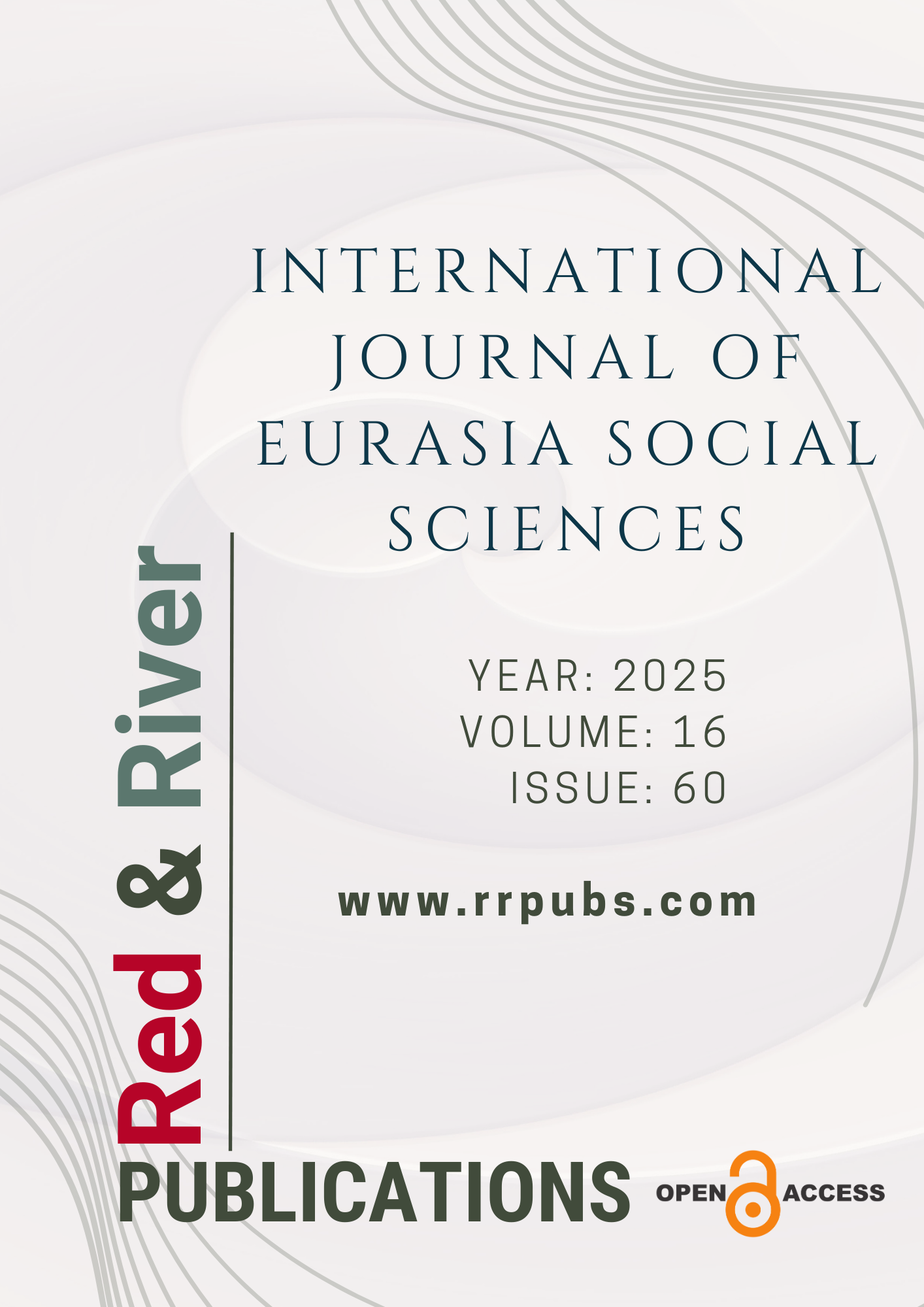Argümantasyon ve iki dilliliğin argümantasyon üzerine etkisi
DOI:
https://doi.org/10.70736/ijoess.1658Anahtar Kelimeler:
Argümantasyon- beceri türleri- bilişsellik- iki dillilikÖzet
Çalışmamızın amacı, argümantasyon ile iki dillilik arasındaki ilişkiyi birikimsel ve bilişsel özelliklerin argümantasyon üzerine etkisi bağlamında ele almaktadır. Argümantasyon, “doğru” bilgiye ulaşmanın yanı sıra ikna etme ve uzlaşı sağlama amaçlarıyla gündelik hayatta sıklıkla başvurulan bir mekanizma olarak karşımıza çıkmaktadır. Bu esnada mevcut bilgilerin mantık süzgecinden geçirilmesiyle amaca yönelik bir akıl yürütme gerçekleştirilmesi söz konusudur. Mevcut bilgiler, dile ve argümantasyon yapısına yönelik bilginin yanında evrensel ve yerel bilgi türlerini içermekteyken; amaç kişinin içinde bulunduğu durumu bireysel açıdan değerlendirip kendini konumlandırması sonucu duruma yönelik aldığı tutuma işaret etmektedir. Bireysel bilgi birikiminin ve durumsallığın getirisi olarak amaçların değişkenlik göstermesi gündelik hayatta yapılan çıkarımların veya öne sürülen iddiaların ve temellendirmelerin dayanak noktalarının farklılık göstermesi sonucunu doğurmaktadır. Bu durum, benzer konular üzerine yürütülen tartışmalarda bilimsel bilgiler, kişisel özellikler, duygusal deneyimler, örnek olaylar, kültürel değerler, toplumsal kabuller gibi farklı kaynaklara göndermelerde bulunulmasının arkasında yatan nedeni anlaşılır kılmaktadır. Konu iki dillilik açısından ele alındığında farklı bir boyut kazanmaktadır. İki veya daha fazla dilsel ve kültürel alanda gelişimini sürdüren kişiler bu yönleriyle tek dillilerden ayrılmaktadır. İki dilliliğin getirisi olan dile, argümantasyon yapısına, dil dolayımıyla edinilen tüm bilgiye dair birikimin yanında akıl yürütmeyle ilgili olan bilişsellik boyutuyla argümantasyon ile iki dillilik arasındaki ilişki araştırmaya değer bir noktaya taşınmaktadır.
Referanslar
Bayer, K. (2007). Argument und Argumentation: Logische Grundlagen der Argumentationsanalyse (2. überarb. Aufl.). Vandenhoeck & Ruprecht.
Bialystok, E. (2009). Bilingualism: The good, the bad, and the indifferent. Bilingualism: Language and Cognition, 12(1), 3–11. https://doi.org/10.1017/S1366728908003477
Bican, G. (2017). İki dilliliğin tanımlanması: Kuramsal tartışmalar ve güncel yaklaşımlar. Ana Dili Eğitimi Dergisi, 5(2), 353–366. https://doi.org/10.16916/aded.298779
Bloomfield, L. (1933). Language. London: George Allen & Unwin Ltd.
Cañas, J. J., Antolí, A., Fajardo, I., & Salmerón, L. (2005). Cognitive flexibility and the development and use of strategies for solving complex dynamic problems: Effects of different types of training. Theoretical Issues in Ergonomics Science, 6(1), 95–108. https://doi.org/10.1080/14639220512331311599
Coseriu, E. (1988). Sprachkompetenz: Grundzüge der Theorie des Sprechens. Francke.
El Berr, S. (2009). Wer sind hier die Experten? Lokales Wissen und interkulturelle Kommunikation in Entwicklungsprojekten mit Indigenen Ecuadors [Doktora tezi, Rheinische Friedrich-Wilhelms-Universität Bonn]. Bonndoc. https://hdl.handle.net/20.500.11811/3975
Feilke, H. (2010). Schriftliches Argumentieren zwischen Nähe und Distanz – am Beispiel wissenschaftlichen Schreibens. In V. Ágel & M. Hennig (Eds.), Nähe und Distanz im Kontext variationslinguistischer Forschung (pp. 207–232). De Gruyter. https://doi.org/10.1515/9783110220872.207
Festman, J., & Kersten, K. (2010). Kognitive Auswirkungen von Zweisprachigkeit. In U. Massler & P. Burmeister (Hrsg.), CLIL und Immersion: Fremdsprachlicher Sachfachunterricht in der Grundschule (pp. 38–52). Westermann.
Grady, J. S., Her, M., Moreno, G., Perez, C., & Yelinek, J. (2019). Emotions in storybooks: A comparison of storybooks that represent ethnic and racial groups in the United States. Psychology of Popular Media Culture, 8(3), 207–217. https://doi.org/10.1037/ppm0000185
Grosjean F. (2010). Bilingual: Life and Reality. Harvard University Press. https://doi.org/10.4159/9780674056459
Grosjean, F. (2020). Individuelle Zwei- und Mehrsprachigkeit. In I. Gogolin, A. Hansen, S. McMonagle & D. Rauch (Eds.), Handbuch Mehrsprachigkeit und Bildung (pp. 13–22). Springer VS.
Hample, D. (2005). Arguing: Exchanging reasons face to face. Lawrence Erlbaum Associates.
Hample, D. (2018). Interpersonal arguing. Peter Lang. https://doi.org/10.3726/B12877
Händel, D., Kresimon, A., & Schneider, J. (2007). Schlüsselkompetenzen: Reden – Argumentieren – Überzeugen. J. B. Metzler. https://doi.org/10.1007/978-3-476-05052-6_6
Harris, L. (2014). Instructional leadership perceptions and practices of elementary school leaders [Unpublished doctoral dissertation]. University of Virginia. https://doi.org/10.18130/V31R6G
Hufeisen, B. (2003). L1, L2, L3, L4, Lx – alle gleich? Linguistische, lernerinterne und lernerexterne Faktoren in Modellen zum multiplen Spracherwerb. Zeitschrift für Interkulturellen Fremdsprachenunterricht, 8(2). http://zif.spz.tu-darmstadt.de/jg-08-02/beitrag/Hufeisen.htm
Kabataş Memiş, E. (2017). Türkiye’de argümantasyon konusunda gerçekleştirilen tezlerin analizi: Bir meta-sentez çalışması. Cumhuriyet Uluslararası Eğitim Dergisi, 6(1), 47–65. https://doi.org/10.30703/cije.321436
Klassert, A. (2020). Wortschatzfindung und Wortfindung bilingualer Kinder: Fallstrecke bei der Diagnostik von Sprachentwicklungen. In T. Fritzsche, S. Breitenstein, H. Wunderlich, L. Ferchland & R. Krug (Eds.), Spektrum Patholinguistik, 13: Nur ein Wort? Diagnostik und Therapie von Wortabrufstörungen bei Kindern und Erwachsenen (pp. 45–58). Universitätsverlag Potsdam. https://doi.org/10.25932/publishup-46077 .
Klein, W. (2015). Argumentation und Argument. In W. Klein (Ed.), Von den Werken der Sprache (pp. 109–150). Vandenhoeck & Ruprecht. https://doi.org/10.1007/978-3-476-05420-3_6
Koch, P., & Oesterreicher, W. (1985). Sprache der Nähe und Sprache der Distanz. Romanistisches Jahrbuch, 36, 15–44. Walter de Gruyter.
Kurtz, K. J., Gentner, D., & Gunn, V. (1999). Reasoning. In D. E. Rumelhart & B. M. Bly (Eds.), Cognitive science: Handbook of perception and cognition (2nd ed., pp. 145–200). Academic Press. https://doi.org/10.1016/B978-012601730-4/50006-8
Lumer, C. (1990). Argumentationsbegriffe und die Funktion von Argumentationen. In H. Pape (Ed.), Praktische Argumentationstheorie: Beiträge zur dialogischen Logik (pp. 81–115). Frommann-Holzboog.
Lumer, C. (2016). Walton’s argumentation schemes. In Proceedings of the Ontario Society for the Study of Argumentation (OSSA) Conference (Vol. 11, Paper 110). https://scholar.uwindsor.ca/ossaarchive/OSSA11/papersandcommentaries/110/
Romaine, S. (1995). Bilingualism (2nd ed.). Blackwell Publishers.
Röhl, K. F. (2022). Analogie: Logik und Argumentationstheorie. Retrieved September 4, 2024, from https://www.rsozblog.de/analogie-logik-und-argumentationstheorie/
Sadler, T. D., & Zeidler, D. L. (2005). The significance of content knowledge for informal reasoning regarding socioscientific issues. Science Education, 89(1), 71–93. https://doi.org/10.1002/sce.20023
Schulz von Thun, F. (1997). Miteinander reden 1 – Störungen und Klärungen. Rowohlt Taschenbuch Verlag.
Spranz-Fogasy, T. (2005). Argumentation als alltagsweltliche Kommunikationsideologie. Deutsche Sprache, 33(1), 141–156. https://doi.org/10.37307/j.1868-775X.2005.02.05
Toulmin, S. E. (2003). The uses of argument (Updated ed.). Cambridge University Press. https://doi.org/10.1017/CBO9780511840005
Uzelgün, M. A., Küçükural, Ö., & Oruç, R. (2020). Argüman analizinde dört yaklaşım. İstanbul Üniversitesi İletişim Fakültesi Dergisi, 59(2), 265–297. https://doi.org/10.26650/CONNECTIST2020-0666
Vogt, R. (2007). Mündliche Argumentationskompetenz beurteilen. Didaktik Deutsch, 12(23), 33–54.
Walter, P., & Wenzl, P. (2016). Kritisch denken – treffend argumentieren. Springer Fachmedien Wiesbaden. https://doi.org/10.1007/978-3-658-10554-9
Walton, D. (2005). Justification of argumentation schemes. The Australasian Journal of Logic, 3, Article 1769. https://doi.org/10.26686/ajl.v3i0.1769
Walton, D., Reed, C., & Macagno, F. (2008). Argumentation schemes. Cambridge University Press.
İndir
Yayınlanmış
Nasıl Atıf Yapılır
Sayı
Bölüm
Lisans
Telif Hakkı (c) 2025 Hüssam Serhat Daşcı

Bu çalışma Creative Commons Attribution 4.0 International License ile lisanslanmıştır.

